A Burn It Down video extravaganza, and thoughts on Neil Gaiman, creative gods, American Gods and rotten pedestals
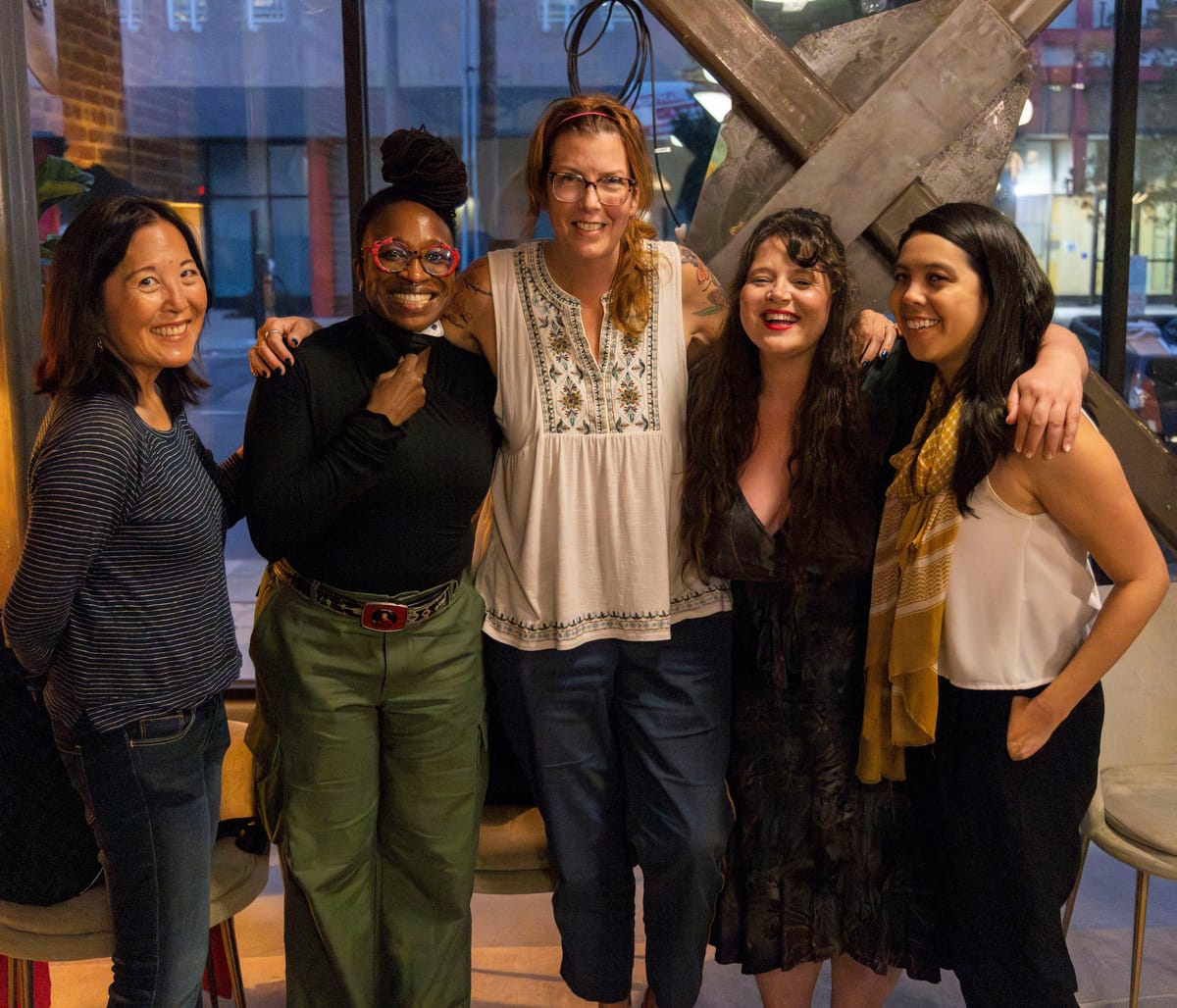
Hello!
Chicago folks, on Wednesday, Aug. 14 at 7 p.m., I’ll be in conversation with my friend Steve Darnall at The Book Cellar in Chicago. The occasion is the reissue of Uncle Sam, a brilliant graphic novel by Steve and Alex Ross. It’s about a lot of things, including the idea of America and the necessity of fighting the urge toward fascism and empty populism. Pretty relevant, I’d say!
It’s also the first Chicago event I’ve done since the paperback of Burn It Down came out, so that’s exciting. Steve and I will have a conversation about our books — and maybe we’ll talk a bit about working together at a very bananas magazine company a million years ago — and then we’ll sign things. Hope you can make it if you’re in Chicago!
Another really fun thing coming up: Because the universe decided to smile upon me, the convention celebrating the 20th anniversary of Battlestar Galactica will take place in Chicago in October. That’s pretty cool, and even cooler (again, for me personally, which is what matters): I’m going to host the convention and moderate some panels. Is this real life? I hope so! If you can come out for part or all of this multi-day shindig, that would be swell, because it’s going to be a blast. So say we all!
Now for the main event: In Los Angeles in June, there was a celebratory event for the paperback release of Burn It Down, which came out a year ago.
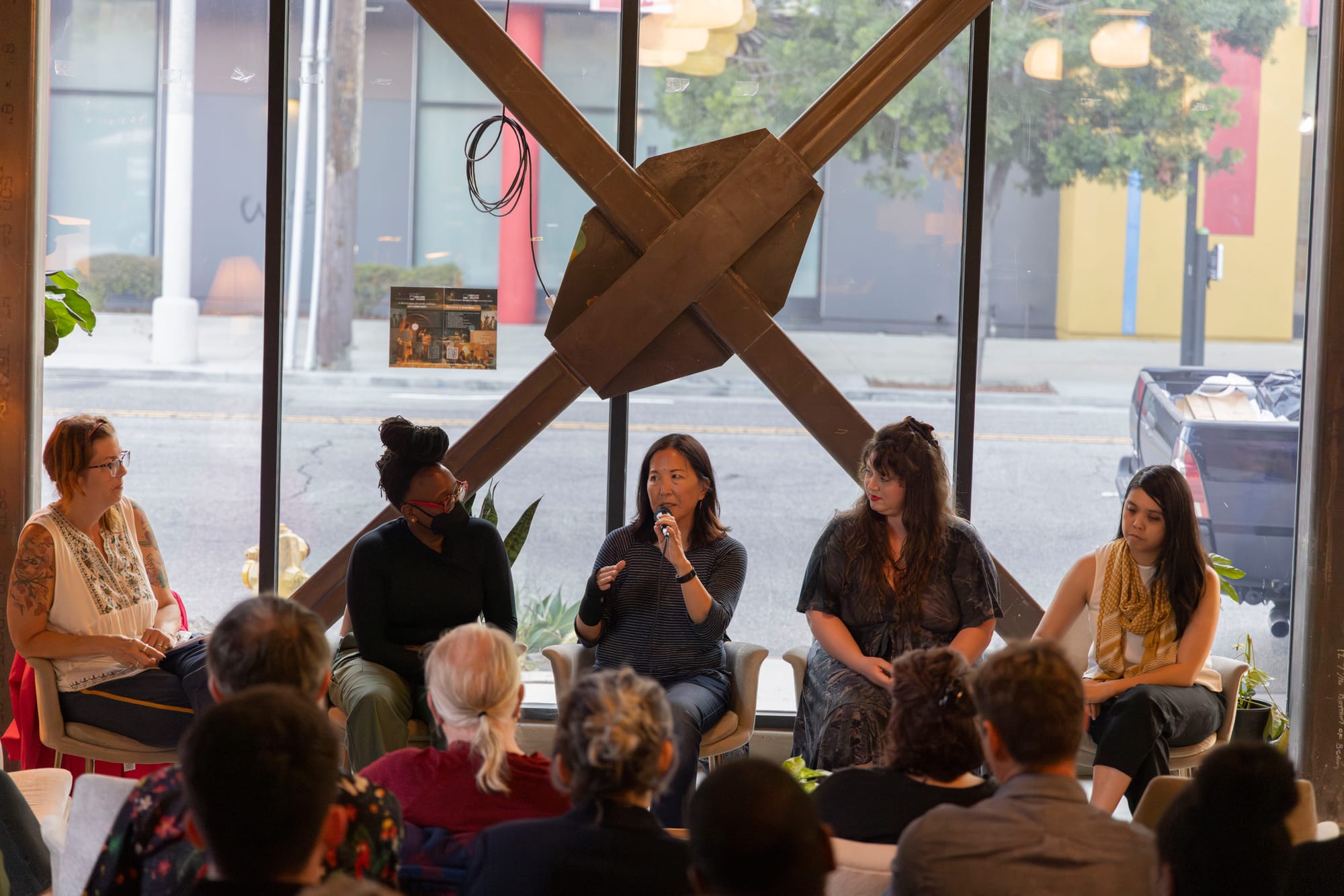
For the event, which was sponsored by the great folks at Women in Film LA, we assembled a panel of illustrious industry veterans: showrunner and creator Melinda Hsu and creator and producer Shernold Edwards (both of whom were interviewed for my book), as well as actor, producer and musician Kether Donohue (she’s been in You’re the Worst, B Positive and many other productions, and perhaps most notably [to me], plays a flying robot called Peanuthamper in Star Trek: Lower Decks).
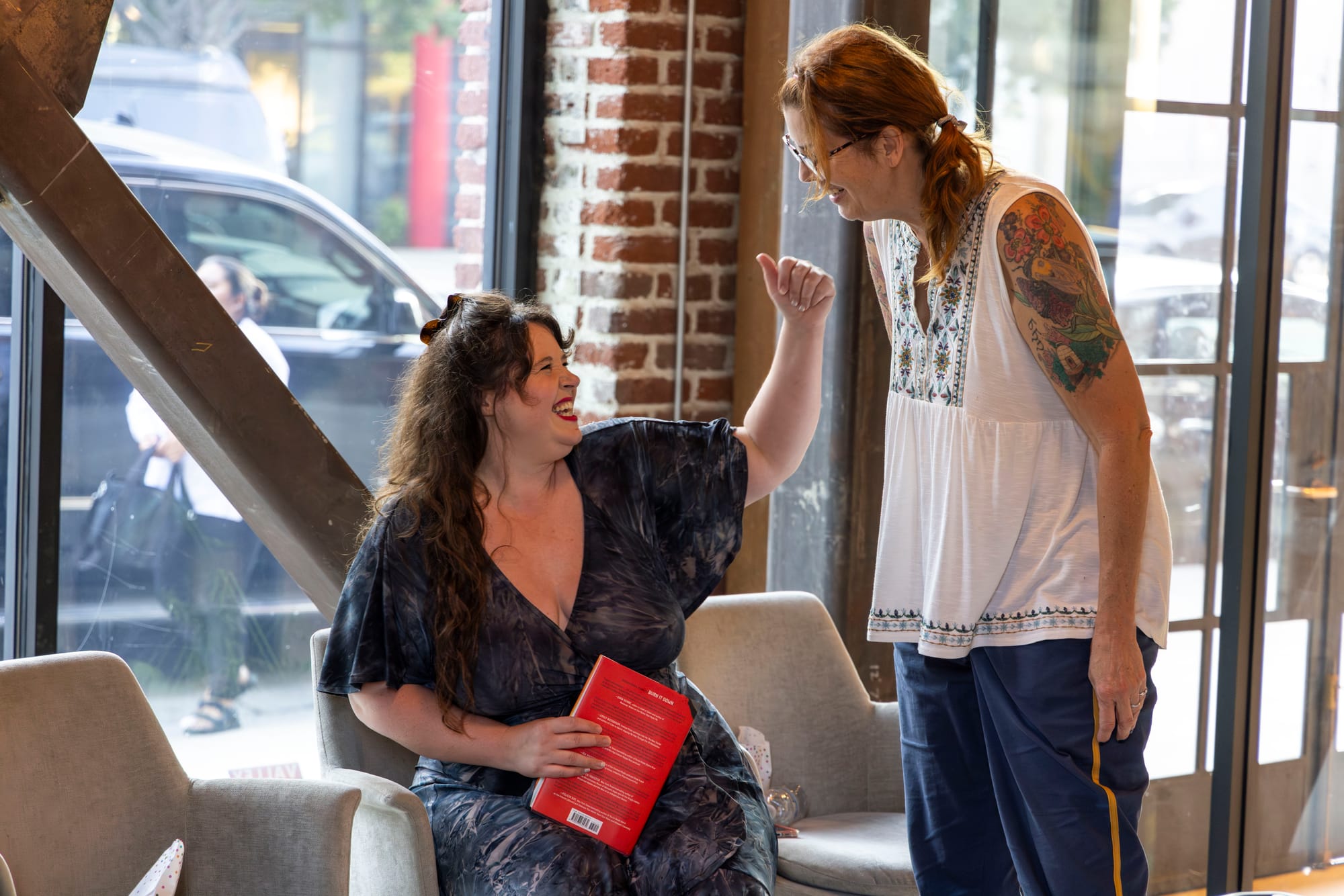
Rounding out the panel was the amazing Maikiko James, Women in Films’ senior director of programs.
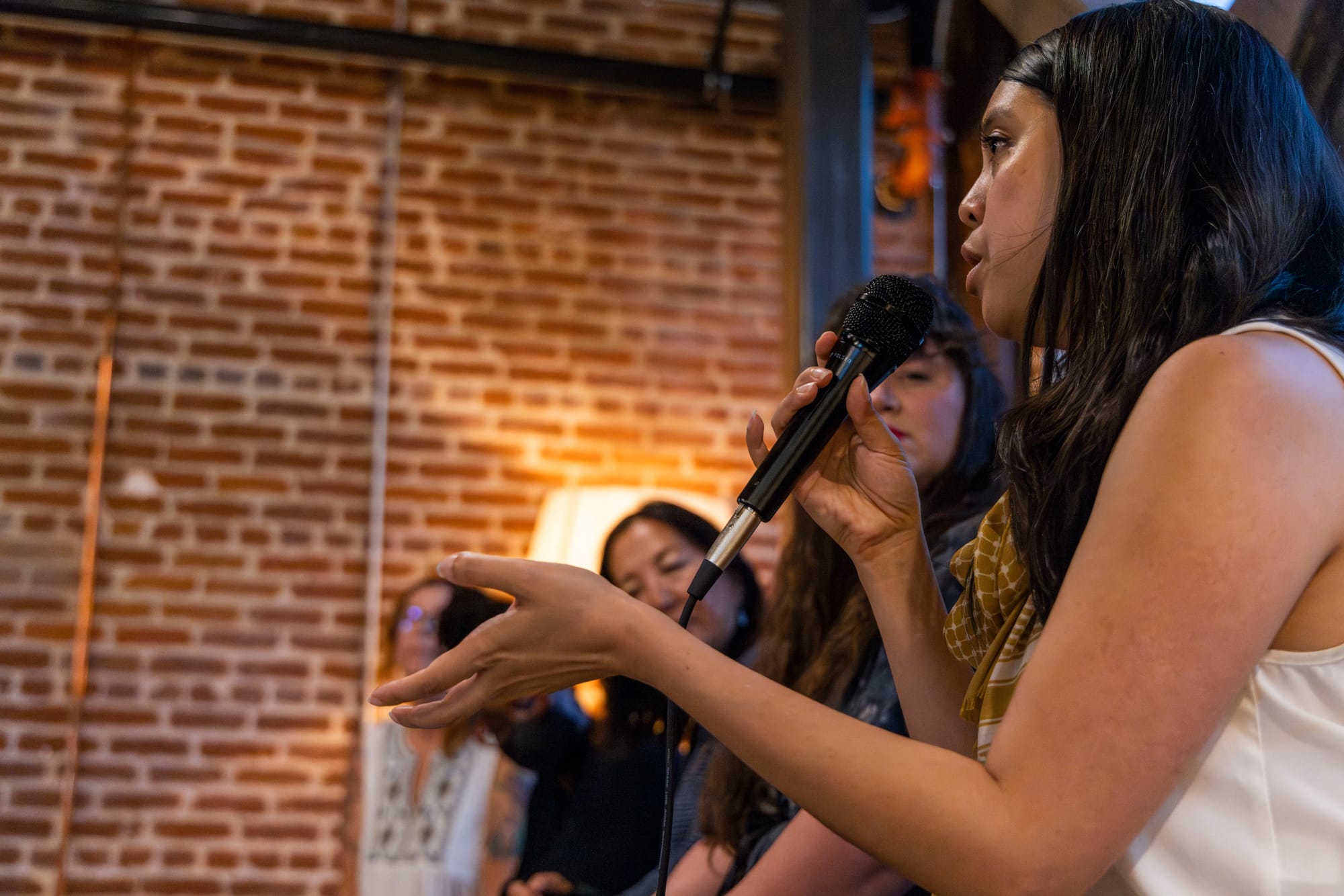
They are all so insightful, so funny and so thoughtful, and I got to converse with them for an hour about matters of Hollywood misconduct, abuse, leadership and reform. We joked and we laughed, and we held space for each other when hard truths were said. We took questions from the audience, and they were terrific. I'm thrilled with how it all went, because it was one the most enjoyable and illuminating panels I’ve ever been part of.
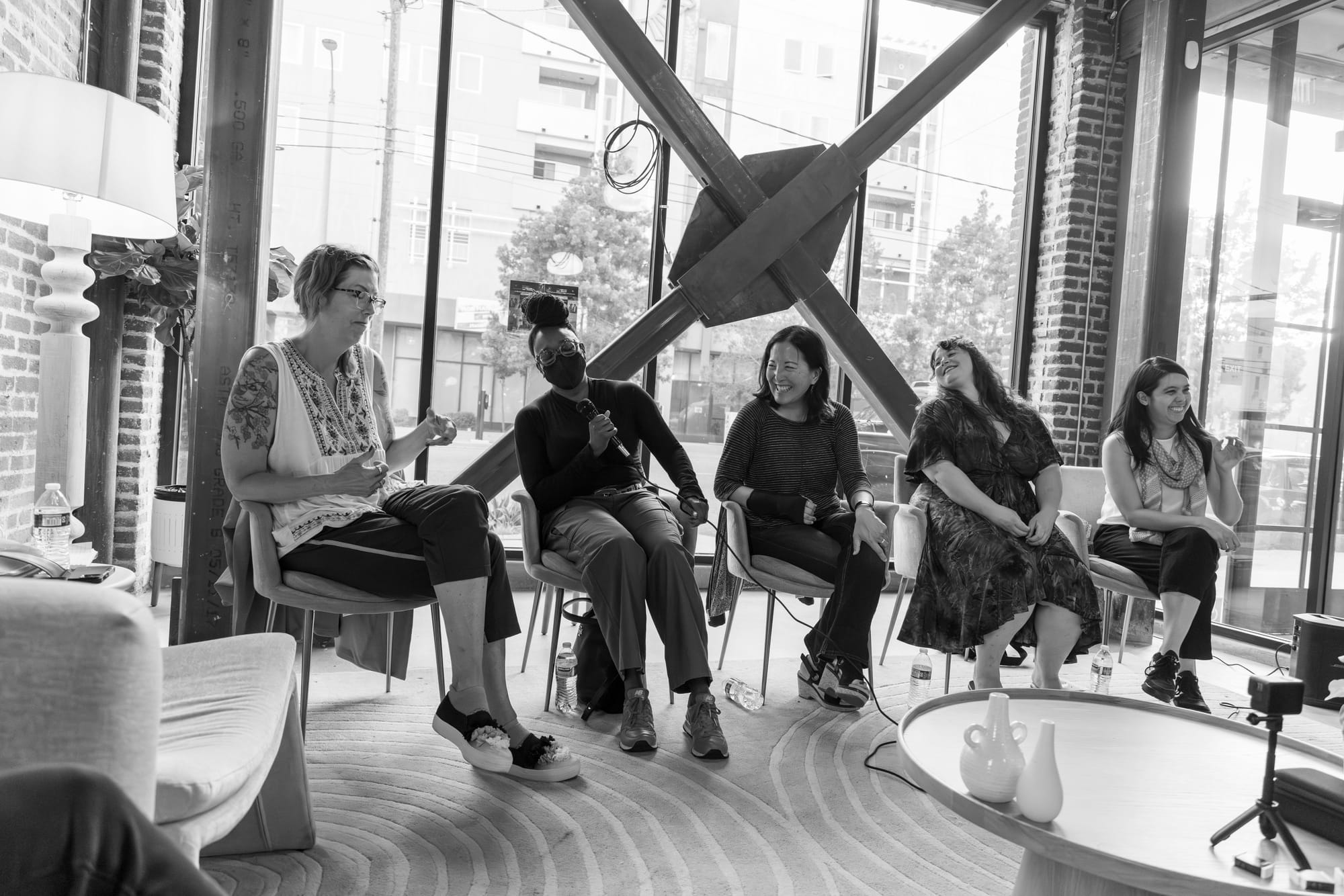
The YouTube video of the event is below. (It’s also on my YouTube page. Hey, could I ask a favor? Could you subscribe to my YouTube channel? If I can get above a certain subscriber count, that would make some things easier for me on the YT front. Thank you in advance!)
What do you think is one of my favorite moments in this video? I BET YOU CAN GUESS!
It fills my heart with joy to inform you that Richard Manning, executive producer of one of my all-time favorite shows, Farscape, came to the event with his lovely wife, Cheryl (hi Ricky and Cheryl!). Ricky filmed the panel and then edited it; that video exists because of him. Thank you so much is not adequate to express my gratitude, especially since Ricky also gave me unbelievably precious pieces of the Moya set as keepsakes. (I keep them near me at all times!) Later, he pointed out that you can’t spell Mo Ryan without Moya (mind * blown). Frelling incredible. (And I will point you once again to my most recent writing about Farscape, a beginner’s guide to the show and its awesomeness.)
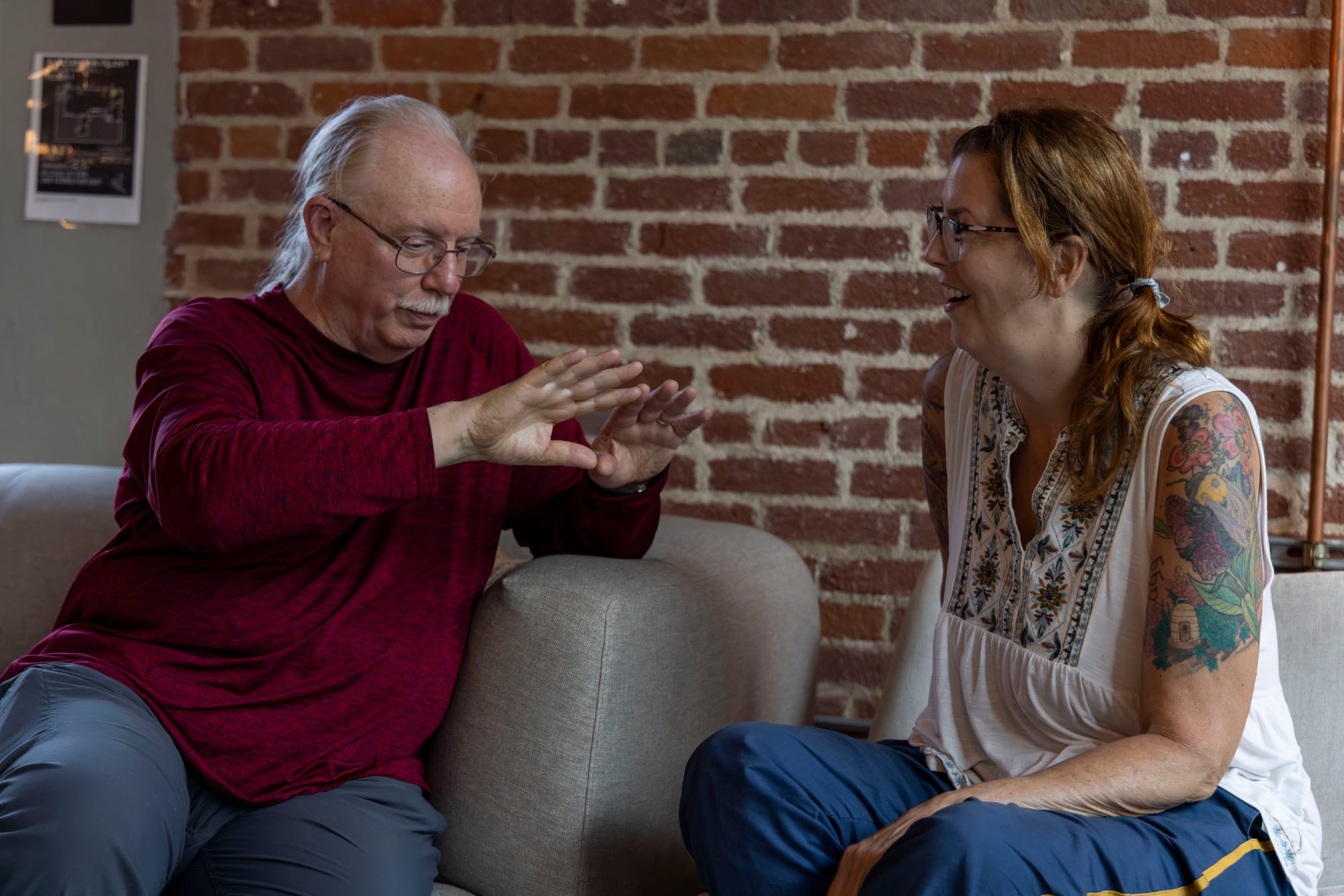
Jerry Jerome, an excellent photographer (who took a lot of great pictures of the Hollywood strikes of 2023), volunteered to take photos of the event, which took place at the very nice co-working space Groundfloor LA. He really captured the event in an organic and lovely way. Thanks, Jerry!
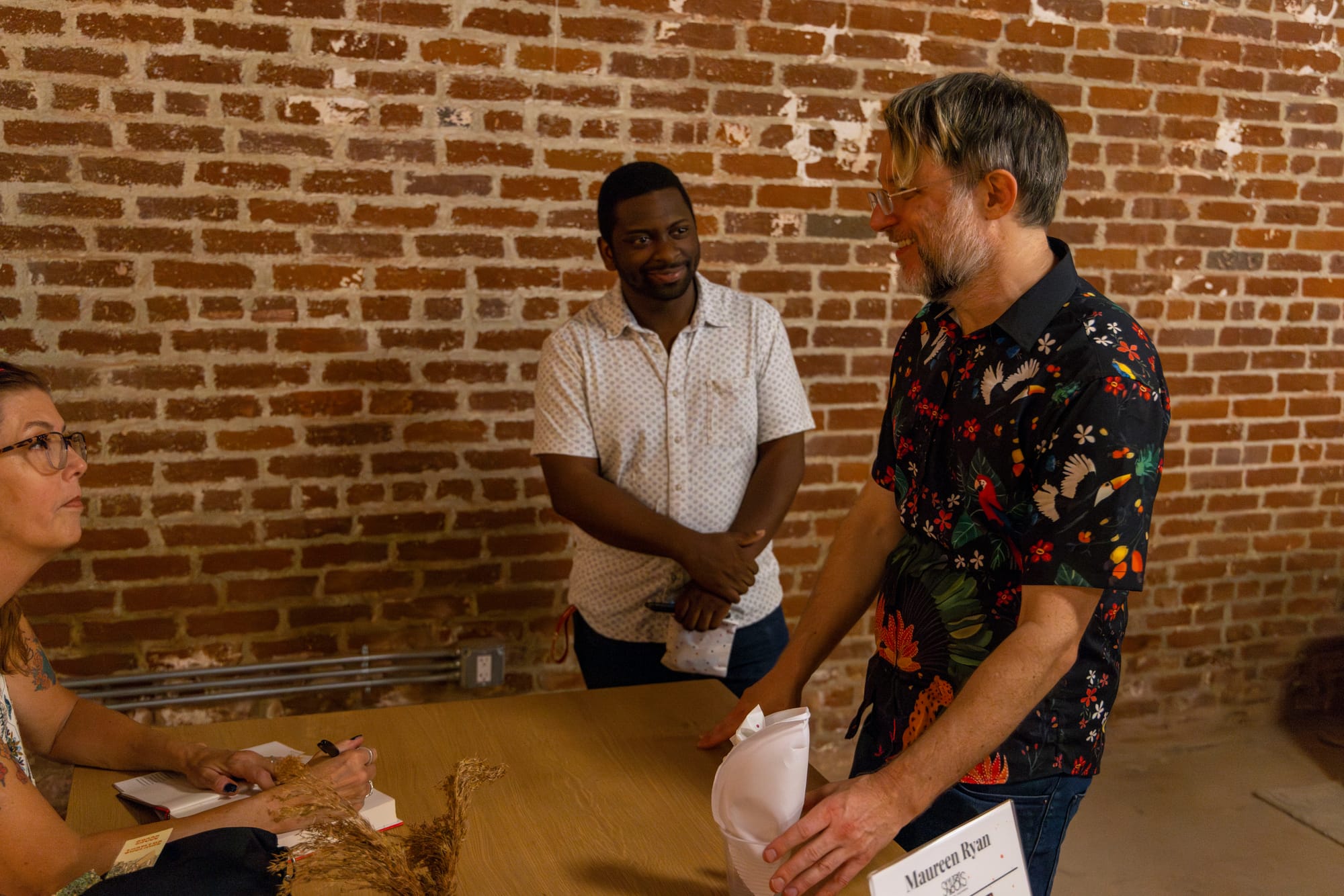
Shoutout to Liz Alper, who worked a lot of behind the scenes magic; to Joseph Mwamba, who brings great vibes wherever he goes; to my former Tribune pal Amy Guth; and to showrunner Sheryl J. Anderson, whom I'd never had the good fortune to meet before, but who was among the industry folks and civilians who turned up on a Thursday night to listen to the conversation and have me sign books.
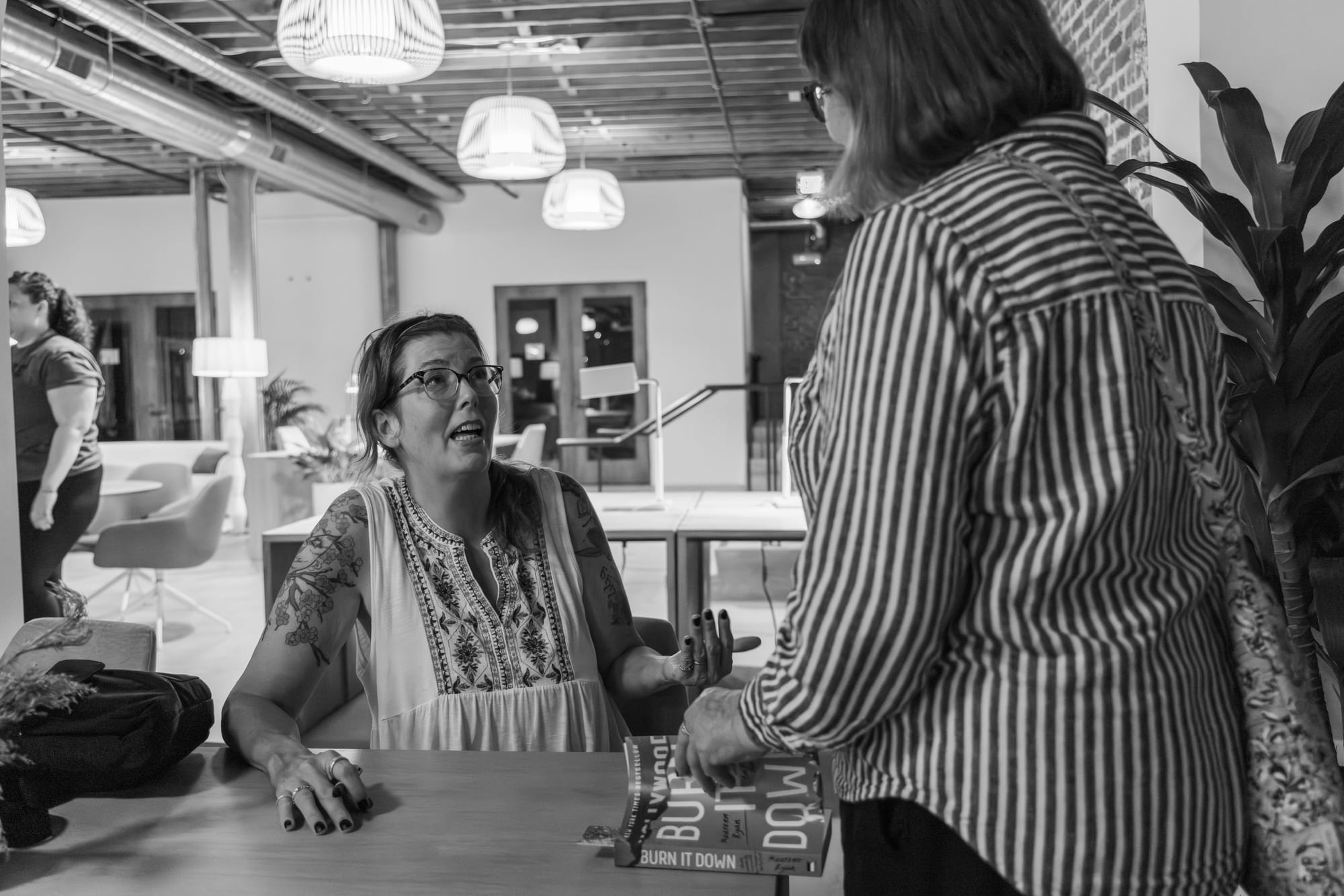
Good times! Truly, my thanks go out to every person who came out to the event. I really enjoyed talking to folks after the panel, and I’m so grateful for the turnout and for the delightful vibes.
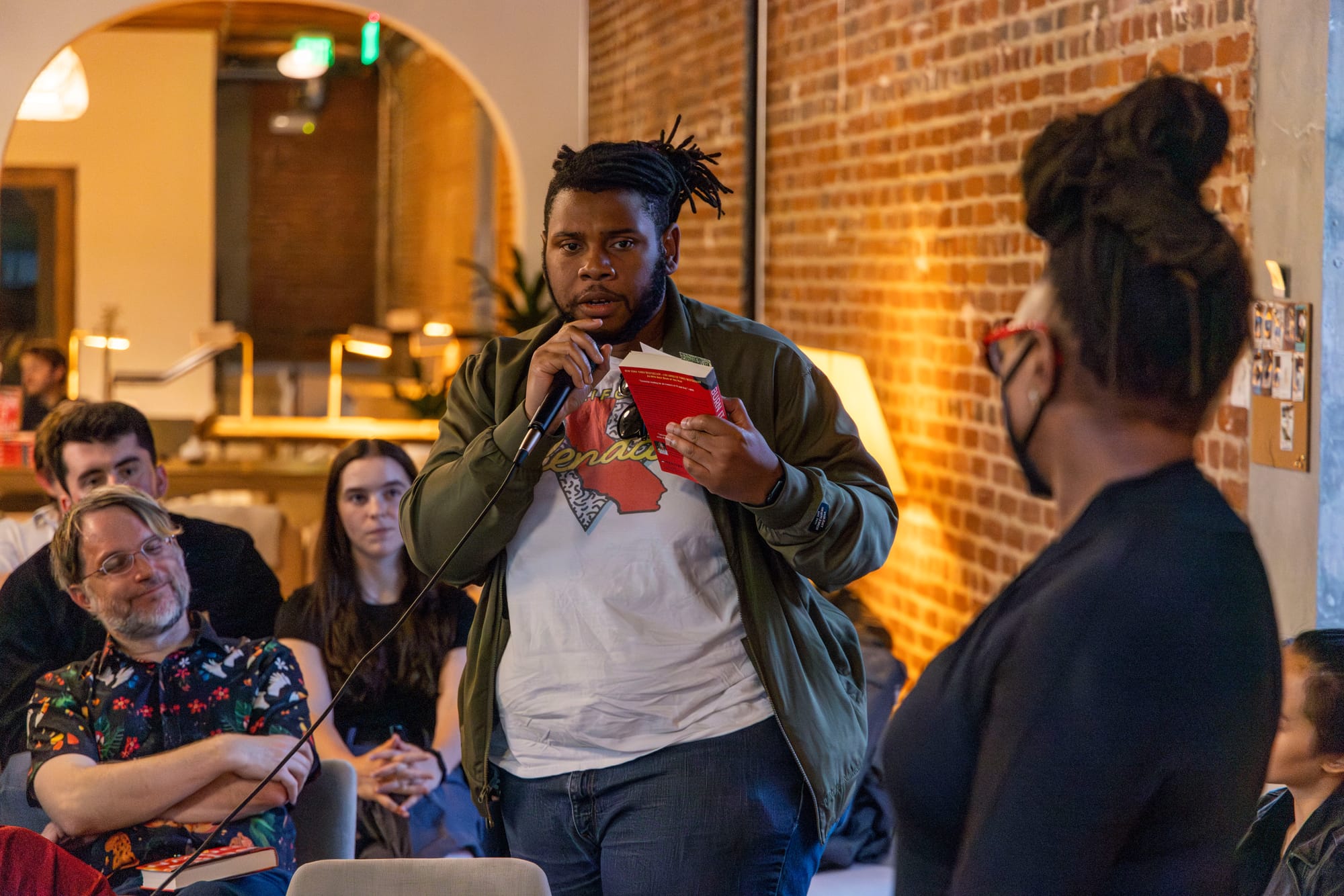
The discussion we had is, of course, eternally timely, because, as Jenny Holzer put it, abuse of power comes as no surprise.
Back in early June, the allegations about Neil Gaiman had not yet surfaced. When they did come out the following month, journalist Annabel Ross had a good analysis of the the first round of reporting (and the problematic issues surrounding it). Another woman came forward on the Am I Broken podcast, in an episode titled “I Ignored It and Believed Him Because He’s the Storyteller.”
The number of times I’ve heard similar assertions fills my soul with sadness. As Ross noted in a subsequent post, the “allegations detailed in the initial Tortoise investigation were extremely disturbing, but I found Claire’s account on Am I Broken even harder to listen to.”
Not long after that, two more women spoke to the Tortoise Media reporters. These allegations were also horrific. All in all, what’s alleged is truly heinous and I am so profoundly sorry about what these women have gone through, and are no doubt still going through.
(Important note: These allegations have been used as a battering ram by some deeply transphobic people, and I want to make it clear that I completely condemn transphobia, TERF-iness and all forms of bigotry against trans people, now and forever.)
It sounds like some of these women approached the media before and didn’t get anyone to take on their stories. If you’ve wondered, I’ve never been approached by anyone with allegations like the ones that recently came to light. And while I would be very surprised if there is not further coverage of this matter, I know from extensive experience that these kinds of investigations take time. A lot of time.
Time, care and attention are required to do this kind of reporting properly, in ways that show compassion and consideration to the survivors, and in ways that pass muster with fact-checkers, editors and lawyers. (Legal review of my book, for example, took about a year, and some stories I’ve done have gone through several months of legal review, especially when the subject of a story has the resources to hire a lot of lawyers, spin doctors and crisis PR firms. Having to engage for months with all those hired guns is about as pleasant as you'd think.)
Because folks have asked, I am not working on any kind of Gaiman followup. In part because I have other commitments that take precedence. In part because what I have to say about these kinds of behaviors, patterns, dynamics and abuses is in my book (and in my previous decades’ worth of in-depth reporting on Hollywood).
And in part because I have already reported on Gaiman, somewhat indirectly, and I did not enjoy a significant aspect of the fallout of that experience.
In 2018, I began hearing about massive issues affecting the TV adaptation of Gaiman’s book American Gods. The debut season's showrunners had been fired abruptly, and the second season, according to my sources, was in deep trouble. I pitched a story to Lesley Goldberg, a friend and a longtime reporter/editor at The Hollywood Reporter — and it turned out she’d been hearing similar things, so we teamed up. As it happened, our sources didn’t overlap much, which was actually a good thing: Between us, we’d gathered a large array of people with a wide range of perspectives, all of whom were saying similar things about the acrimonious chaos behind the scenes.
We worked really hard on that piece, and I felt — and still feel — confident of our sourcing and diligence. What we published, I believe, was not just accurate but prophetic. American Gods certainly wasn’t perfect in its first season, but it was bold, stylish, had a lot of potential and was a solid televisual interpretation of the book. Gods was a far inferior drama in Season 2, and the chaos behind the scenes apparently continued until it was finally cancelled after three seasons. At one point, the following became a running joke among myself and a couple of journalist friends: The shortest roster in Hollywood was the one listing experienced showrunners who hadn’t been asked to take over American Gods.
People are allowed to react to reported pieces however they want, and the folks at or near the center of a story may well have a very different perspective than I do as a journalist. That’s all fine, and that’s not something I generally get worked up about. What I want you to understand about what follows is that I wasn’t upset by the fact that Gaiman had a reaction to that story, or that he appeared to have a reaction that didn’t align with my own impressions. What pissed me off was the nature of that reaction and how it made me feel as an experienced professional.
After the story came out, and then when Season 2 of American Gods finally emerged months later, on social media and in interviews, Gaiman had things to say about our reporting. What pissed me off were remarks that made us sound like pesky little irritants who didn’t know what we were doing. Speaking for myself, I felt he conveyed the impression that we didn’t talk to anybody important or deeply informed or who had knowledge of the real story. (We did.)
This next part is frustratingly difficult to prove in a definitive manner (which is part of what makes this move so effective). Anyway, again, this is just my two cents. But I’m betting every woman reading this can think of a time in her career when the way she was belittled and undermined felt gendered. Fine, take issue with the substance of my work, and if you’re going to do so, come up with a coherent argument about what you think I could have done differently. But what I have never fucking enjoyed — and I’ve come up against this a lot — is a sense of condescension, minimization and dismissal from on high that carries a very strong odor of sexism.
When I saw Gaiman’s comments in various spheres, I felt some kind of way about this supposed champion of women being so gratingly, condescendingly dismissive of the work of two women who had, at that point, half a century’s worth of journalism experience between them. (Two queer women as well, though anyone reading the piece may not have known that.)
After that, whenever I saw his “approachable cool guy” routine on social media, or saw him touted as an ally or feminist, I rolled my eyes pretty hard. Back when all this was going on, I thought about saying some of the above online, because for a while there, I was pretty angry about the way our work was dismissed so arrogantly. But I didn’t say anything in public, in part because I knew it might come off as sour grapes or pettiness.
An even bigger reason I stayed silent was that, after more than 30 years of acclaim, attention and adoration in comics, film, book publishing and TV, Neil Gaiman has a lot of strident defenders and superfans, and ...honestly, that intimidated me. Having had other stan armies hatemob me in the past, I did not have the bandwidth to potentially endure a lot of enraged superfans coming after me. If you think most powerful people don’t know that that’s one of the arrows in their quivers when it comes to wielding their power, I have a bridge I’d like to sell you.
The point is, when it comes to reporters and the powerful people they report on, the power imbalances are often huge. That creates a lot of fear, dread and stress. Even writing this is scary, because he has more money, power and resources than I ever will. But, despite my fears and doubts about doing so, I felt these matters were worth mentioning. Because if the power imbalance between a Great Artist and a well-known member of the media is this skewed, the power imbalance between a Great Artist and a fan, a tenant, a junior colleague or a casual acquaintance is so vast as to be an infinite gulf.
In any event, when it came to that story and how angry I was five years ago, I let it go. Being intensely irritated with or nauseatingly disappointed in a powerful industry millionaire is, and was even then, a pretty regular occurrence. And of course, that tempest in a teapot is nothing compared to what the five women who have come forward have allegedly experienced.
But, speaking generally, I have a lot of experience dealing with egotistical people (most often men) who exist inside a bubble of fame, money, influence and praise, who are used to getting their way, who do not mind throwing their weight around, and who are not unwilling to throw inconvenient people under the bus, especially if those people are female or from a historically marginalized group.
This is what the systems of power, influence and money in creative spheres do: They are structures that place supposed Great Artists or powerful rainmakers beyond the realm of accountability, humility, responsibility and consequences. Great Artists and power players (even the mediocre ones) who misuse their positions don’t do it alone: They receive help, silent endorsement, enabling and all kinds of ass-covering courtesy of those who want to attach themselves to the coattails of the Great Artist or the Big-Time Rainmaker.
And yet it's not rare for those engaging in misconduct or worse to have many in their orbit who do not know the truth. As a few of us have been talking about lately (again), the kind, giving, funny, generous personas many creative narcissists build up and carefully maintain are part of the whole dynamic. As I said at one point, “Never forget, these people choose the targets of their generosity and goodwill and appreciation as carefully as they choose their abuse targets.”
One thing we can do? Burn down the pedestals. All too often, they sit atop crushed dreams, souls, hearts, careers and bodies. All too often, they are filled with rot, propped up by decayed pillars and resting on toxic foundations.
No more pedestals. Because Great Artists don’t exist. People exist. People who are flawed and who, when they gain immense power, a circle of sycophants and enablers, and ultimately have no checks on that power, quite often go down paths that are manipulative, damaging and terrifying. I'm sure a lot of them think of those paths as "challenging creative journeys," "tough leadership" or "sexually adventurous explorations." Uh huh, sure.
When their behavior indicates that that's not what they're doing, they must be stopped. Or, ideally, again and again, before they wreak havoc on individuals, workplaces or entire communities, they are told, again and again, that exploring creativity is not a free pass to damage or destroy anyone or anything in their path. And ideally, long before they leave a trail of hollowed-out, furious, demoralized people in their wake, they see that there are consequences for going ahead with that behavior anyway.
Let’s love art and let's celebrate creativity — but let’s build better communities and more honest and accountable systems. Let’s be there for the powerless (which is most of us). Let's be there to support each other in building formal and informal systems that check the egos and the reach of those who would use their dominant or protected positions in ugly and destructive ways.
Let’s not create another set of monsters that people like me have to spend years chasing through terrifying labyrinths.
Let's build something better. And as for the rest? Burn. It. Down.